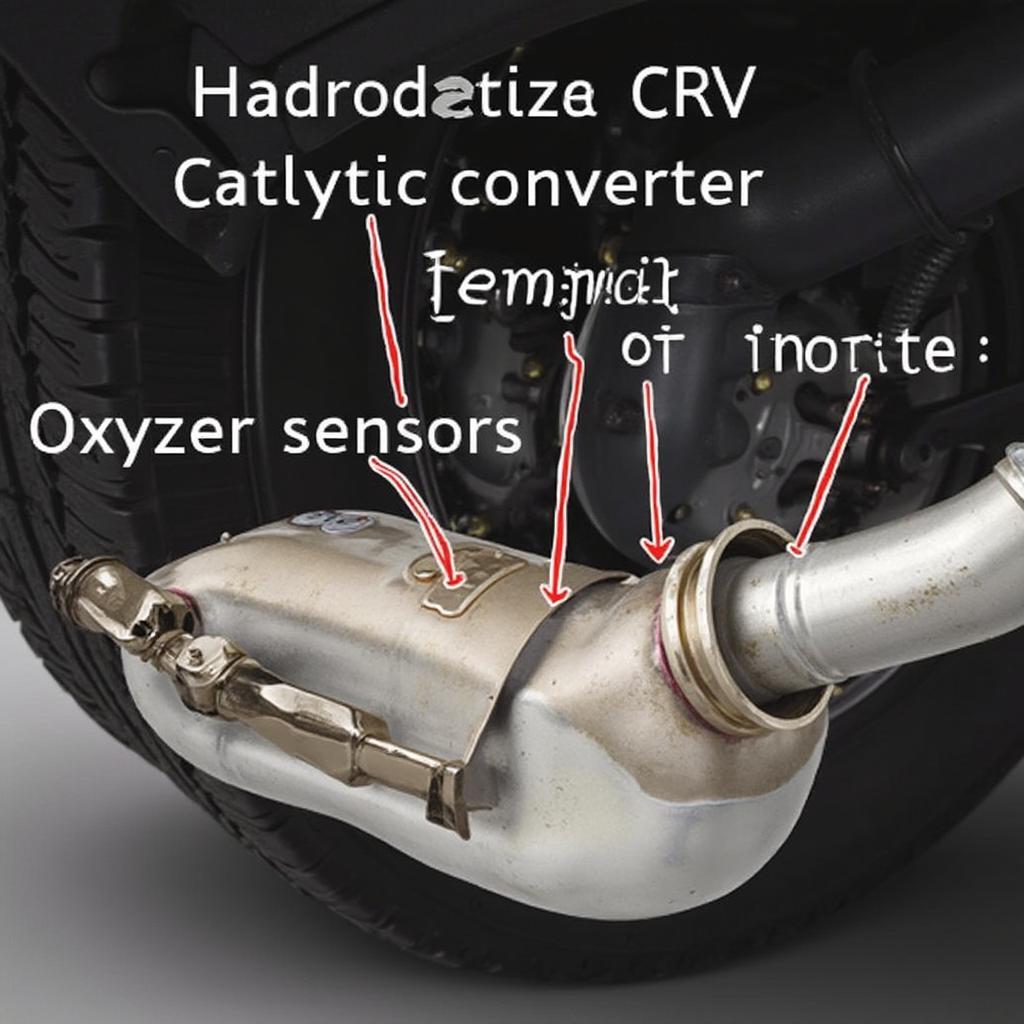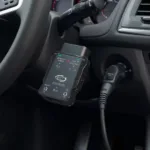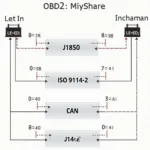The dreaded check engine light has illuminated on your Honda CRV’s dashboard, and after plugging in your OBD2 scanner, you’re staring at the code P0420. This code, particularly common in Honda CRVs, indicates a potential issue with your vehicle’s catalytic converter system. But what exactly does it mean, and how concerned should you be?
This comprehensive guide delves into the intricacies of the OBD2 code P0420 specifically on Honda CRVs, providing you with the knowledge to understand the problem and take appropriate action.
Understanding the OBD2 Code P0420
In simple terms, the P0420 code signifies that your Honda CRV’s engine control unit (ECU) has detected that the catalytic converter is not performing at its optimal efficiency. The catalytic converter is a crucial component of your vehicle’s emission control system, responsible for converting harmful exhaust gases into less harmful substances before releasing them into the atmosphere.
Common Causes of P0420 in Honda CRVs
While a faulty catalytic converter itself can trigger the P0420 code, several other factors can contribute to this issue in Honda CRVs:
-
Malfunctioning Oxygen Sensors: Oxygen sensors, located upstream and downstream of the catalytic converter, play a vital role in monitoring exhaust gas oxygen content. A faulty sensor can send inaccurate readings to the ECU, leading to a false P0420 code.
-
Exhaust Leaks: Leaks in the exhaust system, particularly before the catalytic converter, can disrupt exhaust gas flow and oxygen sensor readings, potentially triggering the P0420 code.
-
Engine Misfires: When your engine misfires, unburnt fuel can enter the exhaust system and damage the catalytic converter over time, reducing its efficiency.
-
Faulty Spark Plugs: Worn-out or fouled spark plugs can also contribute to engine misfires, indirectly leading to catalytic converter issues.
-
Low-Quality Fuel: Using low-quality fuel or fuel contaminated with impurities can negatively impact the catalytic converter’s performance.
Diagnosing the P0420 Code in Your Honda CRV
Before jumping to conclusions about a faulty catalytic converter, a thorough diagnosis is crucial.
-
Check for Other Codes: Scan your CRV for other OBD2 codes, as they might provide valuable clues about underlying issues contributing to the P0420 code.
-
Inspect for Exhaust Leaks: Carefully examine your CRV’s exhaust system for any signs of leaks, such as cracks, holes, or loose connections.
-
Inspect Oxygen Sensors: Check the condition and functionality of both the upstream and downstream oxygen sensors. A visual inspection for damage or excessive carbon buildup can be helpful.
-
Check for Engine Misfires: Look for signs of engine misfires, such as rough idling, hesitation during acceleration, or decreased fuel economy.
Fixing the P0420 Code: What are Your Options?
The solution for the P0420 code in your Honda CRV depends on the underlying cause.
-
Oxygen Sensor Replacement: If faulty oxygen sensors are identified, replacing them is a relatively straightforward and cost-effective solution.
-
Exhaust Leak Repair: Repairing any exhaust leaks is crucial to ensure proper exhaust gas flow and prevent further damage to the catalytic converter.
-
Addressing Engine Misfires: Fixing engine misfires by addressing faulty spark plugs, ignition coils, or other related components is essential to prevent further damage to the catalytic converter.
-
Catalytic Converter Replacement: If the catalytic converter itself is deemed faulty, replacement is often the only solution. Due to their complex construction and precious metal content, catalytic converters can be expensive to replace.
“When dealing with a P0420 code, it’s crucial to address the root cause promptly,” advises Jake Carter, a seasoned automotive technician with over 15 years of experience. “Ignoring the issue can lead to more severe damage to your vehicle’s emission control system and even result in failing an emissions test.”
Preventing Future P0420 Codes in Your Honda CRV
Once you’ve addressed the P0420 code in your Honda CRV, consider these preventive measures to minimize the risk of encountering this issue again:
-
Regular Maintenance: Adhering to your CRV’s recommended maintenance schedule, including regular oil changes, spark plug replacements, and air filter inspections, can significantly contribute to preventing engine problems that can lead to catalytic converter issues.
-
Use High-Quality Fuel: Opting for high-quality fuel from reputable gas stations can help prevent contaminants from damaging your catalytic converter.
-
Address Engine Issues Promptly: Addressing any engine-related issues promptly, such as misfires, rough idling, or decreased fuel economy, can help protect your catalytic converter from potential damage.
Conclusion
The OBD2 code P0420 in your Honda CRV, while concerning, is not an insurmountable problem. By understanding its meaning, potential causes, and solutions, you can make informed decisions about diagnosing and repairing the issue. Remember, timely action and regular maintenance are key to keeping your CRV running smoothly and minimizing the risk of future catalytic converter problems. For specific guidance related to your CRV’s year and model, consult your owner’s manual or a qualified mechanic.
FAQs
Q: Can I still drive my Honda CRV with a P0420 code?
A: While you might be able to drive for a short period, ignoring the P0420 code can lead to more severe damage to your CRV’s emission control system. It’s best to address the issue promptly.
Q: How much does it cost to replace a catalytic converter on a Honda CRV?
A: The cost can vary depending on the year and model of your CRV, as well as labor costs in your area. However, expect to pay a significant amount for a catalytic converter replacement.
Q: Can a faulty catalytic converter affect my CRV’s performance?
A: Yes, a faulty catalytic converter can negatively impact your CRV’s performance, potentially leading to decreased fuel economy, reduced engine power, and a sluggish throttle response.
For more information on Honda CRV OBD2 codes, you can visit these resources on our website:
- 01 crv obd2
- 2004 cr v obd2
- 2001 honda crv dealer code list obd2
- 1998 honda crv obd2 port location
- honda insight obd2 plug location
If you have any further questions or need assistance with your Honda CRV’s OBD2 codes, don’t hesitate to contact us via WhatsApp: +1(641)206-8880, Email: [email protected]. Our dedicated team of car diagnostic experts is available 24/7 to assist you.


